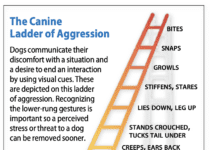It’s well established that while dogs yawn if they’re tired, you’re even more apt to see them yawning when they’re under stress. With yawning, a dog is working to displace the stress, or inner conflict, with a safe, neutral behavior. People do the same thing — not necessarily yawn, but do something to cope with their feeling ill at ease in a situation they can’t get out of.
For instance, perhaps you’re in a hurry to make a meeting on time but hit a red light. You want to keep going, but you have to stay put, in part because it’s the only safe choice to make and in part because someone else, the police, will make sure you comply by following through on the behavior that’s causing you the stress, namely, keeping your foot on the brake until the light changes. So what do you do to cope? Maybe you groom yourself in the rearview mirror, or look at the driver in the car next to you, or fiddle with the radio station. None of these actions has anything to do with what you really want to do — take your foot off the brake and put it on the accelerator — but they help you bide your time until the conflict between what you want to do and what you have to do is over because the light has turned green.
That’s what yawning does for a dog — helps him bide his time. But there’s more. New research from the journal Animal Cognition demonstrates that dogs also yawn because it is contagious, just like among people. That is, they’ll yawn because you do. It’s a cross-species thing.
Istock


Researchers at the University of Tokyo made the finding when they observed pet dogs looking at people yawning. Perhaps most surprising was that dogs yawned significantly more in response to their owners’ yawns than to strangers’ yawns. The bond seems to go as deep for them as it does for us. The researchers call it “emotional proximity,” pointing out that contagious yawning has been shown to correlate with the level of social attachment in several primate species. In fact, they comment that yawning has been empirically related to our capacity for empathy, noting that people who perform better on tests of empathy are more susceptible to yawning contagiously. Indeed, one study has gone so far as to show that the closer the social bond between individuals, the more likely they are to yawn when the other one does. What this all appears to mean is that dogs react to their owners as if the two are of the same species; dogs care about their owners and therefore respond in kind with yawns of their own.
The dogs in the study did not appear to be yawning to decrease stress as a result of being unnerved by their owners’ yawns, by the way. Their heartbeats did not go up in relation to the yawning.
They move like we do, too
It’s often said dogs’ memories don’t sequence events the way ours do. They’re not thinking back to a certain time when something happened and then relating it to what’s going on in the present. But research from Hungary, led by ethologist Claudia Fugazza and also published in the journal Animal Cognition, does suggest that dogs are much more significantly influenced in their behaviors by memorizing things their human families have done and will repeat actions even a while later.
Animal scientists drove home the point by engaging in a specific action, say, ringing a bell, pulling a rolling toy, or walking around a tube placed vertically on the ground but then making various dogs (every kind from border collies to a Yorkshire terrier) wait to copy the action, sometimes up to 10 minutes. During the waiting interval, the dogs were taken to another spot and engaged by the researchers in other activities like catching a ball to make sure their minds were taken off the trick just taught to them. But it didn’t hinder their learning.
When the break was over, the dogs could perform the action that was demonstrated minutes earlier, which in canine terms might as well be the distant past. The more novel the action was that a dog was taught, the less time that could pass before she wasn’t able to follow through. But even with actions the dog had never engaged in before, at least a little time could pass, as much as a minute to a minute and a half. This is the first evidence that dogs possess the ability to engage in what the researchers call “deferred imitation.”
It’s just a small study, of course, and would need to be repeated with more dogs in varying contexts to confirm the findings. But it suggests that dogs have a stronger cognitive ability than we thought and are able to recall new actions and imitate them, having encoded the information during the waiting interval and then retrieved it later on.
It may be, the researchers suggest, that living among people and in human social groups has fostered dogs’ ability to learn by human example and develop “surprisingly complexsocial skills.”





